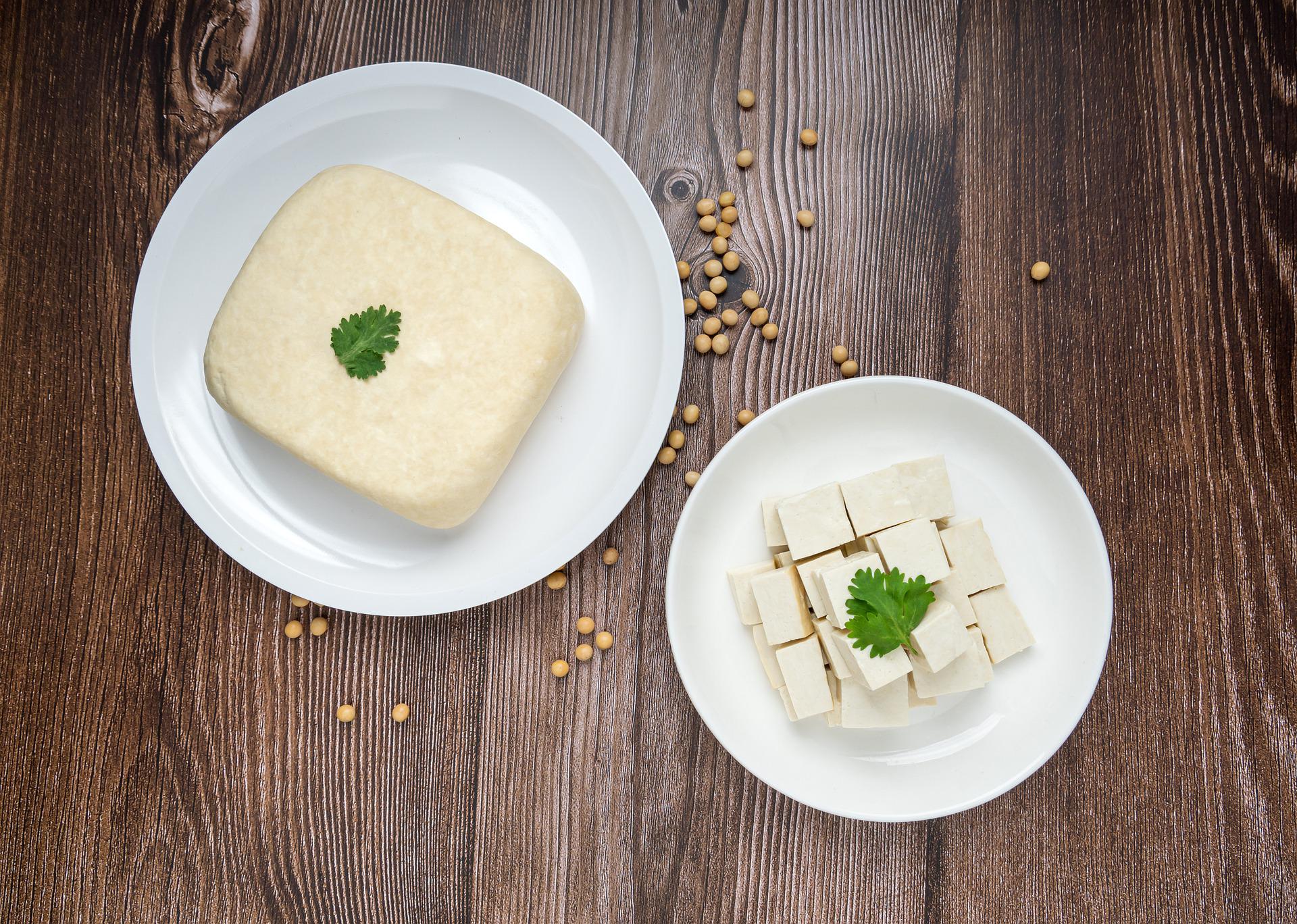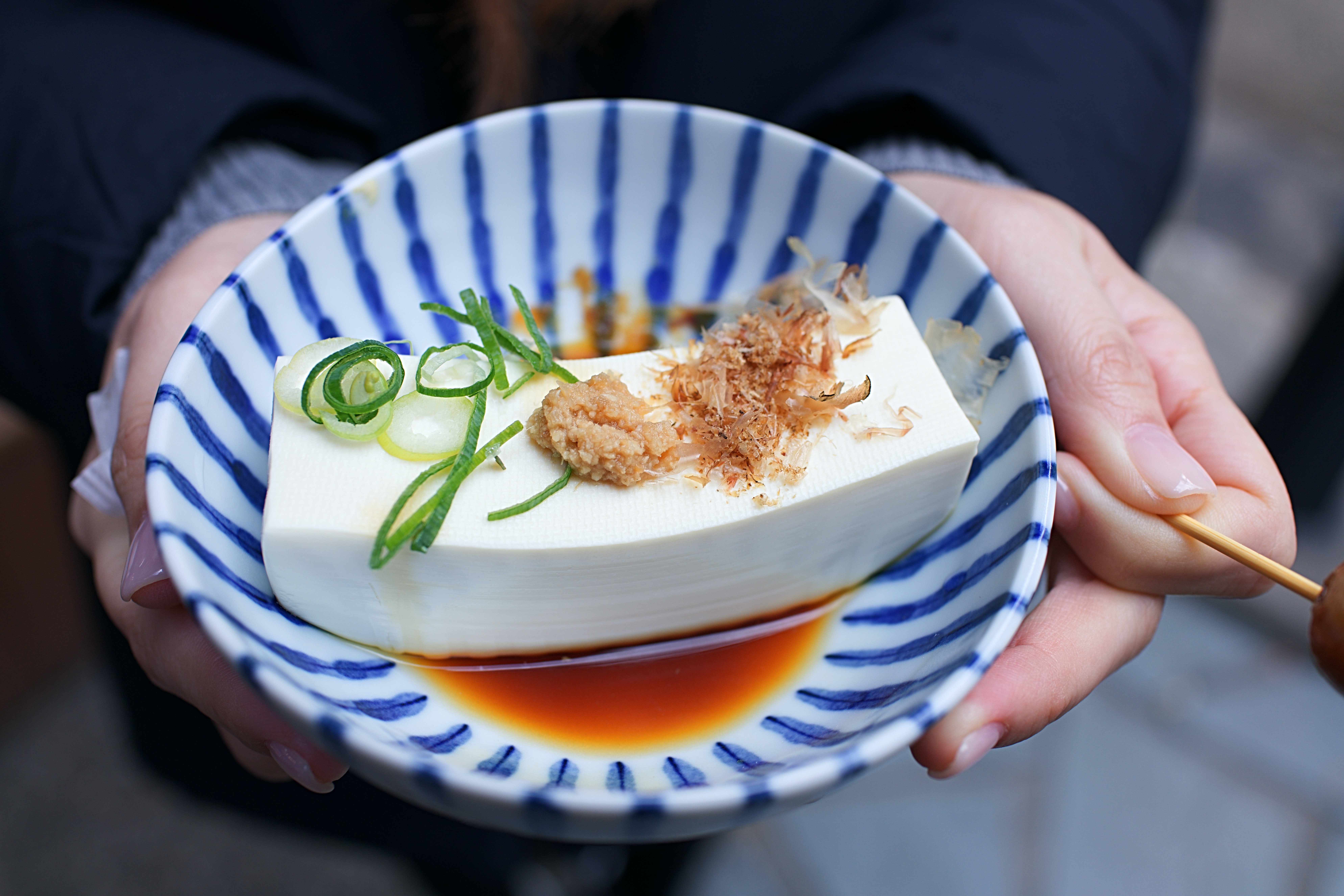China was the birthplace of tofu, also known as bean curd. Some see it in the West as a novel food, but in traditional Asian diets, it is regarded as a staple.
The firmness and water content determine the type. The firmer it is, the more calories and nutrients it contains. As a result, softer types have more water and are lower in calories, carbohydrates, protein, and fat.
This versatile food can be used in a variety of recipes. Unlike many vegetables, it does not possess much flavor, so its taste is highly influenced by what it is cooked with.
This article aims to help you make a more informed decision regarding the health effects of this food.
What is Tofu Made of?
It is made from soybean curds. The soybeans are soaked in water, then ground and strained to create a milk-like liquid. This liquid is then boiled and combined with a coagulant, which causes the proteins to solidify and form curds. The curds are then pressed into blocks.
Depending on the type of coagulant used, the end product may be extra firm, moderately firm, or soft. It can be eaten raw or cooked and is often used as a meat substitute in vegan dishes. It is a good source of protein and contains no cholesterol.
Protein in Tofu
Is Tofu a Carb or a Protein?
This food has about 17 g of protein per 100 g, making it an excellent source of protein. It can be used as a substitute for meat in recipes since it is a complete protein containing all nine essential amino acids. It is an excellent protein source for people who don’t eat meat.
On the other hand, it does not have a lot of carbohydrates. If you’re cutting carbs, you can check if this food is keto-friendly in PlanKetogenic’s guide.
Is Tofu Vegan?
The simple answer to this question is yes, it is vegan. As mentioned above, it is made from soybeans, a type of legume, and it does not contain any animal products and is therefore suitable for vegans.
However, it is important to note that not all types are created equal. Some brands of this product may use animal-derived ingredients in their production process. For example, some brands use calcium sulfate derived from animal bones. As a result, it is important to check the ingredients list before purchasing it to ensure that it does not contain animal products.
Is Tofu Low in Calories?
Depending on the type, it contains extra calories, but 100 g of tofu contains about 144 calories. That’s slightly less than chicken breast, which has 158 kcal per 100 grams.
Does Tofu have Fiber?
Fiber can be found in substantial quantities in soybeans. This food contains very little fiber, only about 2.3 g per 100 g.
Calcium
One serving of 100 g provides around 683 mg of calcium, although this may vary according to the brand and type (check the tofu nutrition label on each product). The calcium content in this dairy-free food is particularly helpful for lactose-intolerant people.
Iron in Tofu
It is a decent source of iron; it has about 2.6 mg of iron per 100 g. The daily requirement of iron varies from 8 mg for an adult male and 18 mg for an adult female.
Vitamin D
It naturally does not contain any vitamin D. However; some brands may fortify it with vitamin D to enrich its overall nutritional value. For example, Nasoya Lite Silken Tofu nutrition facts show one of the highest vitamin D levels per serving, with 3.8 mcg in every 100 g.
Potassium
According to the USDA’s Nutrient Database, the firm type contains 237 mg of potassium in a 100 g serving. (That’s about 7% of the amount men should get each day and 9% for women.) Potassium in tofu is not significantly different from the soft and extra-firm kinds.
Magnesium
It contains about 58 mg of magnesium, which makes up to 14% of the daily requirement of this mineral.
Sodium
Only 15 mg of sodium can be found in 100 g of serving, making tofu a very low sodium food.
Is Tofu Healthier than Chicken?
Chicken is a widely consumed meat and an excellent source of protein.
This table shows different chicken cuts vs. tofu nutrition facts.
| Per 100 g | ||||
| Type of cut | Calories | Net carbs | Protein | Fat |
| Chicken breast | 165 kcal | 0 g | 31 g | 3.6 g |
| Chicken wings | 203 kcal | 0 g | 30.5 g | 8.1 g |
| Chicken thigh | 209 kcal | 0 g | 25.9 g | 10.9 g |
| Chicken drumstick | 172 kcal | 0 g | 28.3 g | 3.6 g |
| Tofu | 144 kcal | 0.5 g | 17.3 g | 8.7 g |
In terms of average protein content, chicken has more protein than tofu. Chicken breasts are lean and a good choice for people trying to lose weight and recuperate from an injury. Those who want to gain weight should opt for cuts with more fat content, such as wings and thighs, to increase their overall calorie intake and get a good protein dose.
However, tofu nutrition is also impressive. It has more fiber, calcium, iron, and magnesium than chicken, although the poultry has more potassium, B vitamins, and calories. All in all, both are healthy options.
Learn more about chicken nutrition facts here.
Is Tofu Nutritious?
Yes, it is an excellent source of protein, including all nine essential amino acids. It is also low in calories and fat and is a source of many vitamins and minerals.
It is also high in phytoestrogens, which can help reduce the risk of certain types of cancer. It is a healthy food that can be enjoyed as a balanced diet.
Is Tofu Good for Weight Loss?
Yes, it is. It may not seem ideal for weight loss because it has carbs and fats, but it can still be incorporated into a great weight loss strategy.
It is a great meat substitute and can help you lose weight. It’s high in protein, which has a satiating effect on the body, ensuring you feel fuller for longer periods.
Is Tofu Bad for you?
Soy-based foods are generally considered safe to consume every day. However, If you have any of these health conditions, you may need to moderate your intake.
- Breast tumors – Some doctors suggest limiting soy intake in women with estrogen-sensitive breast tumors because of its unfavorable hormonal effects.
- Thyroid issues – Some professionals recommend avoiding soy due to its goitrogen content for those with low thyroid function.
Can you Eat Tofu Raw?
It can be eaten raw, including silken, firm, and extra-firm textures. However, suppose you will eat tofu raw without cooking it, for example, by blending it into a smoothie. In that case, storing the food in a cool environment is important to prevent bacteria from growing.
How Much Tofu is too Much?
There isn’t an official recommendation for the amount of it you should eat; however, a fair estimate would be up to 2 servings a day. Generally, more than this amount could be too much, although it depends on your age, body type, and activity level.
For example, someone who is sedentary will have different nutritional needs than someone athletic. You can consult with your doctor or nutritionist to determine the right amount.
This vegan-friendly food is a nutritious, low-fat alternative to meat rich in protein and other nutrients. However, variety is important in any diet, so you want to leave room for other foods. If you are looking for more healthy ingredients to eat while trying to make your diet more plant-based, you may want to check out this guide by PCRM, a nonprofit organization.
Frequently Asked Questions
Following are some questions that we answer regarding this food in the context of special dietary situations.
Does Tofu have Gluten?
No, because it is made from soy, which is a legume, it is a gluten-free food that is safe to eat for people with celiac disease.
Is Tofu Low FODMAP?
Yes. Although it is made out of soybeans, the FODMAPs are eliminated during the production process for firm or extra firm types, resulting in naturally low FODMAP food.
Is it Good for Diabetics?
Yes, it contains only 3 g of carbohydrate per 100 g, making it a low-carb food, meaning it won’t affect the blood sugar too much, making it a good choice for people with diabetes.
Is it Alkaline?
It has a pH level of 7.20, making it a very alkaline food. Hence, it’s a good alternative to meat and fish and good food to improve your alkaline diet.
Is Tofu Anti-Inflammatory?
Yes, it contains many plant compounds, including isoflavones. There is evidence that isoflavones have anti-inflammatory effects on the body.
Can Babies Eat Tofu?
Generally, a baby can be introduced to it around six months, when they are ready to start eating solids. You should consult with your doctor or pediatrician to get an individualized recommendation.



